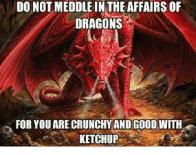A Game Designer's Analysis Of QAnon | by Rabbit Rabbit | curiouserinstitute | Sep, 2020 | Medium
By: Medium


This is a long read but it comes from an interesting perspective.

Playing with reality
I am a game designer with experience in a very small niche. I create and research games designed to be played in reality. I've worked in Alternate Reality Games (ARGs), LARPs, experience fiction, interactive theater, and "serious games". Stories and games that can start on a computer, and finish in the real world. Fictions designed to feel as real as possible. Games that teach you. Puzzles that come to life all around the players. Games where the deeper you dig, the more you find. Games with rabbit holes that invite you into wonderland and entice you through the looking glass.
When I saw QAnon, I knew exactly what it was and what it was doing. I had seen it before. I had almost built it before. It was gaming's evil twin. A game that plays people. ( cue ominous music )
QAnon has often been compared to ARGs and LARPs and rightly so. It uses many of the same gaming mechanisms and rewards. It has a game-like feel to it that is evident to anyone who has ever played an ARG, online role-play (RP) or LARP before. The similarities are so striking that it has often been referred to as a LARP or ARG. However this beast is very very different from a game.
It is the differences that shed the light on how QAnon works and many of them are hard to see if you're not involved in game development. QAnon is like the reflection of a game in a mirror, it looks just like one, but it is inverted.
Guided Apophenia
In one of the very first experience fictions (XF) I ever designed, the players had to explore a creepy basement looking for clues. The object they were looking for was barely hidden and the clue was easy. It was Scooby Doo easy. I definitely expected no trouble in this part of the game.
But there was trouble. I didn't know it then, but its name was APOPHENIA.
Apophenia is : "the tendency to perceive a connection or meaningful pattern between unrelated or random things (such as objects or ideas)"
As the participants started searching for the hidden object, on the dirt floor, were little random scraps of wood.
How could that be a problem!?
It was a problem because three of the pieces made the shape of a perfect arrow pointing right at a blank wall. It was uncanny. It had to be a clue. The investigators stopped and stared at the wall and were determined to figure out what the clue meant and they were not going one step further until they did. The whole game was derailed. Then, it got worse. Since there obviously was no clue there, the group decided the clue they were looking for was IN the wall. The collection of ordinary tools they found conveniently laying around seemed to enforce their conclusion that this was the correct direction. The arrow was pointing to the clue and the tools were how they would get to it. How obvious could it be?
I stared in horror because it all fit so well. It was better and more obvious than the clue I had hidden. I could see it. It was all random chance but I could see the connections that had been made were all completely logical . I had a crude backup plan and I used it quickly before these well-meaning players started tearing apart the basement wall with crowbars looking for clues that did not exist.
These were normal people and their assumptions were normal and logical and completely wrong.
In most ARG-like games apophenia is the plague of designers and players, sometimes leading participants to wander further and further away from the plot and causing designers to scramble to get them back or (better yet) incorporate their ideas. In role-playing games, ARGs, video games, and really anything where the players have agency, apophenia is going to be an issue.
This happens because in real games there are actual solutions to actual puzzles and a real plot created by the designers. It's easy to get off track because there is a track. A great game runner (often called a puppet-master) can use one or two of these speculations to create an even better game, but only as much as the plot can be adjusted for in real time or planned out before-hand. It can create amazing moments in a game, but it's not easy. For instance, I wish I could have instantly entombed something into that wall in the basement because it would have worked so well, but I was out of luck!
If you are a designer, and have puzzles, and have a plot, then apophenia is a wild card you always have to be concerned about.
QAnon is a mirror reflection of this dynamic . Here apophenia is the point of everything. There are no scripted plots. There are no puzzles to solve created by game designers. There are no solutions .
QAnon grows on the wild misinterpretation of random data, presented in a suggestive fashion in a milieu designed to help the users come to the intended misunderstanding. Maybe "guided apophenia" is a better phrase. Guided because the puppet masters are directly involved in hinting about the desired conclusions. They have pre-seeded the conclusions. They are constantly getting the player lost by pointing out unrelated random events and creating a meaning for them that fits the propaganda message Q is delivering.
There is no reality here. No actual solution in the real world. Instead, this is a breadcrumb trail AWAY from reality. Away from actual solutions and towards a dangerous psychological rush. It works very well because when you "figure it out yourself" you own it. You experience the thrill of discovery, the excitement of the rabbit hole, the acceptance of a community that loves and respects you. Because you were convinced to "connect the dots yourself" you can see the absolute logic of it. This is the conclusion you arrived at. More about this later.
[snip]
dO tHe ReSeaRcH
The fictional reason Q doesn't just tell the world what they know is that Q wants you to "do your own research" and come to your own conclusions. How polite…
This is not a real reason. Q does not want you to come to your own conclusions. Q is feeding you conclusions. This is VERY important and here are several reasons why this is included in the verbiage of almost every fictional conspiracy theory ever.
1: Follow The Breadcrumbs
Telling people how and what they should think is the path of most resistance. Ideas that challenge us can do just the opposite of convincing us or enlightening us, but further engrain our old ideas. Even when presented with factual evidence.
"It is well known that people often resist changing their beliefs when directly challenged, especially when these beliefs are central to their identity1,2,3,4,5,6. In some cases, exposure to counterevidence may even increase a person's confidence that his or her cherished beliefs are true7,8."
https://www.nature.com/articles/srep39589
Strongly held beliefs are literally a part of us. As such, attacks on core beliefs are treated very much as attacks on us , even as strongly as a physical attack.
"The brain's primary responsibility is to take care of the body, to protect the body," Jonas Kaplan, a psychologist at the University of Southern California, tells me. "The psychological self is the brain's extension of that. When our self feels attacked, our [brain is] going to bring to bear the same defenses that it has for protecting the body."
Why we react to inconvenient truths as if they were personal insults.
By Brian Resnick
If the ideas are generated by us, however, then these are the ideas we defend. If we "create" the ideas in our own minds, they become fused much more intently into our personality. They're OURS. There is no friction. Guiding people to arrive at YOUR conclusions is a perfect way to get people to accept a new and conflicting ideology.
Getting them to arrive at the destination can be a little tricky. You have to guide them there one little step at a time.
In QAnon parlance, these steps, or trail markers leading you into the forest, are called breadcrumbs. Little morsels Q disperses that are easy to digest that lead the players towards wherever Q is guiding them. One little bite at a time.
But the breadcrumbs are not facts, they are questions. Puzzles and clues for the "investigators" to uncover.
This leads us to another reason Q would really like you to do your own research.
2: The Eureka Effect
Puzzle-solving is a special way to learn and it encodes information into the brain in a different way than other learning. Puzzles and knowledge gained through our own efforts are incredibly rewarding and also come with a hit of dopamine, the brain's pleasure drug, as a reward.
As far back as 1978, it has been known that having an "Aha!" moment increases retention of memories.
Recently, a report published in 2018 in the journal Human Brain Mapping found that Aha! moments also activate the brain's reward systems.
Aha!-moments are characterized by hyperactivation in (a) nucleus accumbens, which has been shown to be involved in the feeling of relief, ease, and joy , (b) VTA, which is related to the encoding of certainty about a decision , (c) the posterior hippocampus, responsible for memory reorganization following an insight, and (d) aSTS/STG associated coarse semantic coding.
[…]
As those structures are part of a dopaminergic pathway, associated with reinforcement , we suggest the Aha!-Moment as a special form of fast retrieval, combination, and encoding process.
https://onlinelibrary.wiley.com/doi/pdfdirect/10.1002/hbm.24073
Basically, that "A Ha!" moment when puzzle solving (even when incorrect) is extremely pleasurable and also may help encode what we learn in a new way.
It also helps reinforce the desire to seek out and solve new puzzles.
In other words, solving puzzles is extremely rewarding from a biochemical standpoint and the thoughts we gain from them are special to us.
3. Lamestream Media
Another extremely important "reason" for propagandists to get people to "do the research" is to instill a natural distrust for society and the competency of others.
There is no need for QAnons to do the research because the fact is, the research has already been done and been done by thousands of trained professionals. The FBI, CIA, and countless non-profits dedicated to solving the issues of trafficking and abuse have already been working on these issues for decades. If anons really wanted to do the research they should research getting a license in social work, psychology, criminal justice, or really anything that might actually be considered research.
Do your own research means. "Don't trust other people. Don't trust institutions. Listen to me."
The conspiracy plot always has the same logic. The reason no one knows about the conspiracy is because of the conspiracy. Not because it doesn't exist.
Then initiates are given the tools to arrive at "their own conclusions" which are in every way more compelling, interesting, and solve more problems than traditional conclusions. Because they are wrong and fictional.
4: Community
Solving puzzles together is a great way to form community and to join community. ARGs are famous for this. Everyone has something to focus on, a shared interest, and something to do. The puzzles are often just a way of getting together. If Q drops some clues, then you have something to do and you have people to do it with. It's bonding. The same reason puzzles are used in corporate team building exercises and party games.
Especially if those people are there with the intent to make you feel and think something specific. To befriend you and make you feel special. Working together on something is a great way for that to happen.
[snip]
Not Organic
"It's probably some guy who posted a few things on 4Chan and it just took off!" or "This thing came out of nowhere! It's gone viral!" People think QAnon is viral and organic because that is the intent of QAnon. It's part of its own story and propaganda.
As a producer of ARGs, this stuff is hard to produce and maintain and keep interesting. QAnon works, again, in an opposite manner from a regular ARG.
Normally, if an indie ARG or interactive story goes unexpectedly viral, the creators begin to struggle. They have less money to spend on more people, more interactions, and a story that gets consumed faster and faster. They have no more time/money/staff and eventually, they have to wrap it up. Even commercial ad-based ARGs are exhausting to run. It's a sprint from the first post and no matter how short, it feels like a marathon. (Ok, mine did, I'm sure there are better producers out there)
This thing goes the reverse way. The more people join it, the more money goes into it. The more effort, the more PR, and the more content.
The more people try to shut it down (Google, FB, Reddit, Instagram, service providers, TikTok, etc.) the more the Q runners double down, getting ever bigger endorsements from the top politicians in the world.
There is money here and it's not grassroots. It's not a huge amount of money, but this is a system from which Facebook said had removed
" 790 groups, 100 Pages and 1,500 ads with links to QAnon. It's also blocked over 300 hashtags across Facebook and Instagram and restricted 1,950 groups and 440 pages on Facebook and over 10,000 accounts on Instagram."
- The Verge
The same week Facebook did this, President Trump got on camera during a press release and endorsed them. He called them a growing, popular movement, and said he appreciated them. When asked if he believed the basic premise that he was "secretly saving the world from this satanic cult of pedophiles and cannibals" he replied with "is that supposed to be a bad thing? If I can help save the world from problems, I'm willing to do it, I'm willing to put myself out there. And we are actually, we are saving the world from a radical left philosophy that will destroy this country."
This is not a loner on the internet that started dropping a few posts and suddenly went viral. I've met those people. I've been on those projects. It doesn't happen like this.
This is a media campaign. This is a coordinated propaganda campaign.
[snip]
There is a LOT more at the link.
WHO is behind this 'media campaign' and WHY?





It could be become a very dangerous religious political cult
Yep, this shit can be fun (games and puzzles) or it can be dangerous -
Excellent seed. Novel approach.
Thanks.
A great read.
How long until the porn industry releases the new title - QAnus?
I only came here because of your comment. That's fantastic!
Jim met Sara when she ordered a pizza for delivery. He had no idea that he’d soon be taken for a ride, deep down her rabbit hole ...
That makes it even funnier!
All QAnon followers are insane.
QAnon followers otherwise known as QLoons.